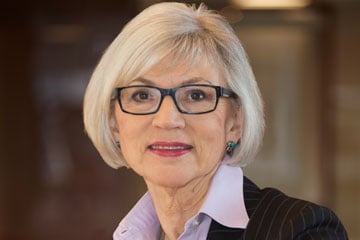
As a young lawyer in Alberta and British Columbia, Beverley McLachlin had done some commercial and construction law, and she enjoyed it; later, as a trial judge in B.C. in the early 1980s, she continued to hear these types of cases.

As a young lawyer in Alberta and British Columbia, Beverley McLachlin had done some commercial and construction law, and she enjoyed it; later, as a trial judge in B.C. in the early 1980s, she continued to hear these types of cases.
Now, after retiring as chief justice of the Supreme Court of Canada in December — after more than 28 years on that court, including nearly 18 years as chief justice — McLachlin is trying her hand at arbitration and mediation.
“I find it fascinating to take problems that arise, that people have or that companies have, and try to sort it out and figure what the best way forward is and apply the law to the facts I find,” McLachlin told Legal Feeds. “I love this procedure; I’ve been doing it for most of my life, and I thought I’d like to continue.”
Yesterday, Arbitration Place, which operates arbitration centres in Toronto and Ottawa, announced that McLachlin, who is bilingual, had joined its roster as an arbitrator and mediator in Canada and internationally. (She also currently sits as a justice of Singapore’s International Commercial Court and the Hong Kong Court of Final Appeal.) Her appointment will boost the number of Arbitration Place’s female arbitrators to three out of a total of 31.
Louise Barrington, another arbitrator at Arbitration Place, sees McLachlin’s appointment as “a wonderful role-modeling situation” for young women in a field in which there are still a dearth of women. She calls McLachlin “our flag” for promoting diversity in the field and heightening awareness that there are excellent and experienced women available to serve as arbitrators.
Barrington, who has an international arbitration practice, says Canada tends to favour ad hoc arbitration — a proceeding that is not administered by an institution and requires parties to a dispute to make their own arrangements for selection of arbitrators — rather than institutional arbitration, in which a specialized institution administers the arbitration process using its own set of rules to provide a framework for the arbitration.
“Institutions have recently caught on to having women [arbitrators] as a selling point,” says Barrington. “They can say, ‘We’ve doubled our representation.’ But Canada doesn’t need institutional arbitration that much, and there’s no visible marketing angle for a firm or counsel to want a diverse tribunal. Once they become aware of the business case for a diverse tribunal, they may change their minds.”
This business angle includes a broader range of opinions and perspectives, avoiding “group think,” she says.
“It means everybody has to challenge each other and respectfully listen to each other. Tribunals are collegial, [and] there’s some fear that women won’t be able to stand up to men in a collegial situation, so they’ll be outnumbered.”
As well, men are often thought to have more gravitas, she says — an assumption which the appointment of a former chief justice of Canada as an arbitrator may help to dispel.
Arbitration Place has recently partnered with ArbitralWomen, of which Barrington is a co-founder (with Mirèze Philippe, special counsel to the secretariat of the International Chamber of Commerce, International Court of Arbitration, in Paris). This international non-governmental organization was started in 1993 with the goal of bringing together female practitioners in international dispute resolution and advancing their interests. That now includes a mentoring program for more junior arbitrators and regular meetings in 40 countries.
Common denominators for successful women in arbitration, Barrington has observed, is that they are multilingual — allowing them to better appreciate the cultures and relate to the parties with whom they’re working — and have supportive spouses.
ArbitralWomen boasts close to 1,000 members around the world. However, cautions Barrington, the fact that there are more female arbitrators now makes it dangerous to say, ‘We’ve done it.’
“We’ve simply cracked the glass ceiling,” she says. “If we stop before [reaching 50 per cent female representation], everyone will fall back into the way we’ve done it before, because it is easier. … Unless we keep pushing, we’ll lose ground.
“Beverley, in joining Arbitration Place, is joining a wonderful community of very talented, dedicated and personable arbitrators. . . . But having her is having a fabulous star in our universe; you can’t get better.”
For her part, McLachlin is looking forward to her new work and to continuing to serve as a role model to women.
“As a lawyer, I enjoyed commercial law and construction law very much, and it’s not a man’s field necessarily; I never saw why,” she says. “And I am surprised that there are so few women doing arbitration. But I’m hoping I can make a small difference and perhaps encourage other women to follow suit.”
McLachlin will join three other former Supreme Court justices at Arbitration Place: Ian Binnie, Thomas Cromwell and Marshall Rothstein. Janet Walker, a professor of international law and former associate dean of Osgoode Hall Law School in Toronto, is Arbitration Place’s other female arbitrator.
Editor's Note: July 26, 2018 4:20 p.m. Story updated to add Marshall Rothstein's name as former Supreme Court justice also part of Arbitration Place.